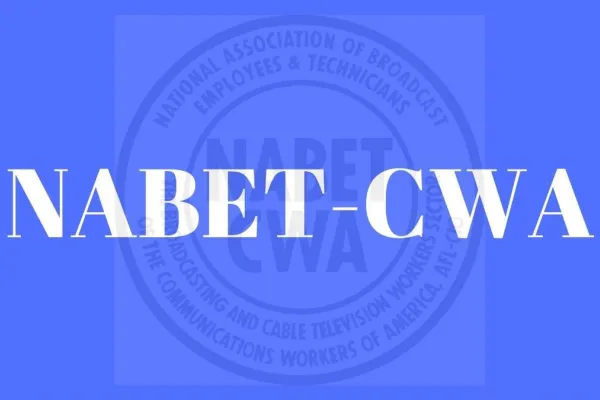President’s Perspective

NABET-CWA
Sector President
Charlie Braico
2017 started off with a bang – a bang over the head for the labor movement and working families. Just 12 days after Donald Trump was inaugurated President of the United States, Republicans in Congress re-introduced a national right-to-work bill that would significantly hinder unions’ ability to represent workers rights and, at the same time, negatively impact worker’s wages. This legislation came on the heels of Trump’s nomination of Andrew Puzder, a millionaire fast-food CEO who opposes minimum wage increases and trumpets the value of robots over humans, as Secretary of Labor. Nationwide worker protests put the spotlight on Puzder’s contempt for working people and forced him to withdraw his nomination a day before his confirmation hearings. I hope that these attacks on working families right out of the gate will encourage our members to become engaged participants in their future and the future of our Union.
During the campaign, Trump said he is “100 percent” in favor of right-to-work laws. Such a law would repeal the requirement that employees pay dues to the union, entitling employees to the benefits of a union – negotiations, grievance handling and organizing – without paying the cost. In states with these right-to-work laws, workers are less likely to be in a union and are paid less (average hourly wages are as much as 15.8 percent higher in non-RTW states).1 Employees in these states also are less likely to receive health insurance or pensions from their employers. Since Election Day, Kentucky and Missouri legislatures have already passed RTW bills and Colorado, Connecticut and Maine are considering such laws.
This is not just an issue for union members; it is an issue for all workers as there is a relationship between declining union membership and lower incomes for everyone. Unions set a standard for compensation and benefits that compels employers to offer similar wages and benefits to its workers. This legislation has nothing to do with workers’ rights and everything to do with killing unions by defunding them.
Trump’s nomination of Andrew Puzder (CEO of CKE Restaurants, which includes the Carl’s Jr. and Hardee’s chains) demonstrated a frightening disdain for workers. Puzder, who makes more in one day than a typical fast food worker makes in one year,2 consistently opposed increases to the federal minimum wage and updates to overtime rules. He also famously extolled the virtues of replacing workers with machines: “They’re always polite, they always upsell, they never take a vacation, they never show up late, there’s never a slip-and-fall, or an age, sex, or race discrimination case.”3
His withdrawal displayed what the power of workers coming together with other activists can do. The weeks of rallies, Congressional testimony, calls and social media efforts, under the hashtags #NotOurLaborSec and #Fightfor15, should give us all hope that working people still have a say in our democracy.
The new Labor Secretary nominee – R. Alexander Acosta – sat on the National Labor Relations Board under George W. Bush, which may provide insight into how he will uphold the Department of Labor’s mission “To foster, promote, and develop the welfare of the wage earners, job seekers, and retirees of the United States; improve working conditions; advance opportunities for profitable employment; and assure work-related benefits and rights.” Or, how the Department of Labor plans to raise the pay of America’s workforce, especially the working poor – an issue that resonates with the majority of Americans.
One thing that the new Administration’s direct attacks on workers and their families have shown is that they will not go unchallenged. If we are to have any chance of improving our lives and the lives of others, we must become more fully engaged and involved – at the bargaining table, in mobilizations and through political action. Without unity, we have no chance of convincing corporations to raise our wages or expand job opportunities. Through solidarity, however, we can prevail.
1 Economic Policy Institute, “’Right-to-Work’ States Still Have Lower Wages,”
April 22, 2015
2 TalkPoverty.com
3 Business Insider, March 16, 2016
NABET-CWA / NBCU-VERSANT MEDIA, LLC (MS NOW) NEGOTIATIONS


